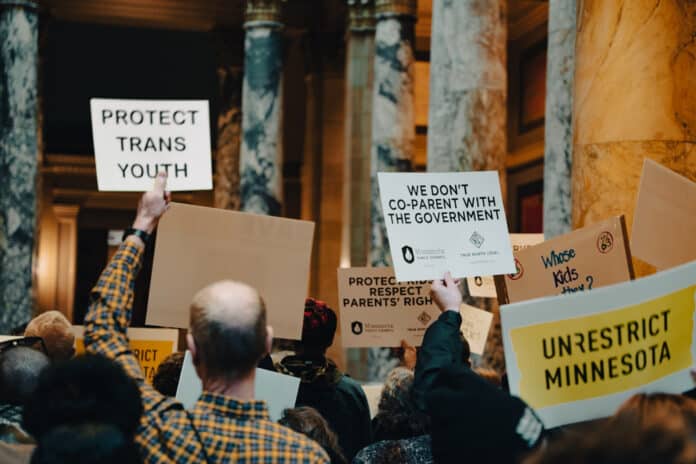
(Daily Caller News Foundation) — Activists and medical organizations that promote cross-sex interventions for minors have failed to create treatment standards for detransitioners, and often refuse to acknowledge the harm inflicted upon them, according to medical experts.
Numerous detransitioners — individuals who undergo medical transitions but come to regret it — have come forward in recent years, often expressing disappointment with doctors and other adults who rushed them through treatments at a young age without adequate mental health assessments. Detransitioners experience a host of negative health outcomes and irreversible physical changes, but the medical industry publicly downplays their struggles and does not offer guidance for safely halting or reversing medical transitions, experts told the Daily Caller News Foundation.
Dr. Susan Bradley, a Canadian psychiatrist and an early pioneer in child gender dysphoria treatment, told the DCNF there was insufficient guidance for detransitioning patients because medical industry professionals are ideologically committed to quickly affirming a patient’s chosen gender and hesitant to admit that patients are being wrongly fast-tracked onto cross-sex interventions.
“I do not think there is any guidance for doctors treating these individuals as the Affirmative Approach was created when ‘wokeism’ had really begun to take hold and it was politically incorrect to question the wisdom of what they were doing,” she said. “The medical practitioners who promote transition believe that they are doing the right thing and preventing these kids from committing suicide.”
‘Completely in the dark’
The transgender medical industry’s failure to craft treatment guidance for detransitioners has resulted in severe harm to individuals who regret undergoing cross-sex medical interventions, experts told the DCNF.
A recent paper, titled “Iatrogenic Harm in Gender Medicine,” found that medical professionals have failed to provide safe treatment pathways for those who wish to halt and reverse their medical transitions. The growing cohort of detransitioners, the paper argues, reveals problems with the gender-affirmation model of medical treatment that some in the field would prefer to ignore.
“Rather than acknowledging the severity of the problem or that the medical community bears responsibility for the harm done to these young people, the message is that there have been no mistakes — the situation is dynamic,” wrote University of Toronto researcher Sarah Jorgensen, the paper’s author.
“Little is known about the psychological and medical needs of detransitioners and there is currently no guidance on best practices for clinicians involved in their care,” she argued. “We must recognize detransitioners as survivors of iatrogenic harm and provide them with the personalized medicine and supportive care that they need.”
The Endocrine Society’s most recent Clinical Practice Guidelines for Gender-Dysphoria/Gender-
The World Professional Association for Transgender Health’s (WPATH) most recent update to its Standards of Care acknowledges detransitioners, but minimizes the phenomenon, calling it rare and blaming societal pressures such as anti-transgender discrimination rather than rushed treatments. The guide also considers unease with one’s gender transition part of the “process of identity exploration [that] should not necessarily be equated with regret, confusion, or poor decision-making,” and states repeatedly that detransitioners should be supported and recommends a “comprehensive multidisciplinary assessment that will include additional viewpoints from experienced health care professionals in transgender health.”
“It is vital that people who detransition, for any reason, be supported,” the standards of care read. “It should be remembered, however, this is a rare occurrence and the literature shows consistently positive outcomes for the vast majority of [transgender or gender diverse] adults who transition to a gender that is comfortable for them, including those who receive [gender affirming medical and/or surgical treatments].”
Chloe Cole, a young woman who underwent hormones and a double mastectomy in adolescence that she now regrets, struggles with a variety of medical issues including mastectomy-related graft problems and possible fertility issues, which doctors have not successfully addressed. She told the DCNF medical professionals have dismissed the challenges she experienced as a result of her medical transition.
“I’ve struggled to find medical care for detransition to an extreme degree,” she said. “I am completely in the dark about my fertility and I have no idea how my reproductive anatomy is damaged. I have never met a detransitioner who was satisfied by their medical care. No doctor knows how to detransition a patient. We were an experiment going in and it seems as if the experimentation will never end.”
Dr. Stanley Goldfarb, former associate dean for curriculum at the University of Pennsylvania School of Medicine and current chair of Do No Harm, told the DCNF that medical associations are abandoning young detransitioners.

“No matter how one might feel about children undergoing treatments as part of so-called gender affirming care, the idea that the medical world and medical societies, in particular, have turned their backs on children that have decided to discontinue transitions and return to their natal biologic condition is truly appalling,” he said. “It is crucial that these children be supported both psychologically and medically because of the profound impact of puberty blockers and sex-altering hormones and possibly even surgical procedures have on their minds and bodies.”
“That the American Academy of Pediatrics has refused to conduct an analysis of detransitioners can only be considered shameful. Children deserve better,” he said.
‘These interventions were the right decision’
Proponents of gender transitions are quick to dismiss patients’ regret as part of a broader “gender journey” and argue that their regret doesn’t indicate that medical practitioners did anything wrong.
For example, a 2022 paper written by two medical doctors and a researcher who are vocal proponents of child sex changes argued that, even in cases of regret, cross-sex medical interventions were often the best course of action at the time the decision was made.
“The fact that some individuals discontinue or reverse gender-affirming medical or surgical care has been woefully politicized, often used as evidence to criminalize the provision of medical care,” two medical doctors and a researcher wrote in a 2022 paper. “For many, these interventions were the right decision at the time and an important aspect of their lived journey.”
One of the paper’s authors, Dr. Jack Turban, is an LGBT activist who has received research funding from pharmaceutical companies that produce medications used in gender transitions. Dr. Christine Brady is a clinical assistant professor at Stanford who specializes in youth gender issues, and Dr. Johanna Olson-Kennedy is the medical director at Children’s Hospital Los Angeles’ Center for Transyouth Health and Development.
Once detransitioners become impossible to ignore, there will be a big push to try to make us part of the acronym. That’s already what we hear from our doctors, “this is just part of your gender journey.”
I don’t think most detransitioners will take too kindly to this rhetoric.
— Chloe Cole ⭐️ (@ChoooCole) April 10, 2023
The paper cited a survey in which some patients who halted cross-sex medical interventions said they did so due to external pressure rather than internal reasons. Turban has publicly downplayed the harm experienced by detransitioners.
“We will also discuss the politicization of ‘detransition’ and discontinuation of gender-affirming medical care, highlighting that bans on gender-affirming medical care for transgender youth are dangerous and misguided,” he wrote on Twitter in 2021 regarding a talk he was slated to give at an annual meeting for the American Academy of Adolescent Psychiatry. “Gender identity is allowed to evolve over time, and this does not represent pathology. It is the role of pediatric mental health providers to support young people in their gender journey, keeping the door open for gender identity to evolve in any way the child feels is authentic.”
WPATH’s standards of care are similarly cautious to note that detransitioning does not necessarily indicate that anything went wrong, but can instead be a sign of an evolving gender identity as part of one’s process of self-discovery.
“Some [transgender and gender diverse] adults may also experience a change in gender identity over time so that their needs for medical treatment evolve. This is a healthy and reasonable process for determining the most comfortable and congruent way of living, which is informed by the person’s gender identity and the context of their life. This process of identity exploration should not necessarily be equated with regret, confusion, or poor decision-making because a TGD adult’s gender identity may change without devaluing previous transition decisions.”
A 2022 paper from several advocates of transgender procedures in the medical field discouraged the use of the word “regret” when describing detransitioners for fear that it could advance a narrative that supports restrictions on cross-sex procedures for minors. The paper also claimed anti-transgender discrimination motivated people’s decisions to detransition.
“Harmful terms such as ‘desistance’ and ‘regret’ have been misapplied to gloss over the suffering that [transgender] people experience in an overwhelmingly cisgender society,” the paper read. “Some people who have transitioned change their gender expression for deeply personal reasons, which may include the pressures and hostilities of an increasingly anti-transgender climate.”
Cole told the DCNF that her own medical providers had similarly downplayed the harm she experienced after expressing regret about the procedures she underwent.
“When I came to my so-called gender specialist with deep regret from transition, they told me it was ‘just part of my gender journey,’” Cole said. “I find that extremely inappropriate. Is getting in a head-on collision just part of a road trip journey? It’s really just plain and simple malpractice and there’s no way to sugarcoat it.”
Jorgensen, the Endocrine Society, the AAP and WPATH did not respond to the Daily Caller News Foundation’s request for comment.
















